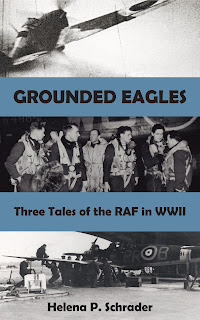Remembering the Less Famous
I want to end this retrospective on the RAF's bomber offensive in WWII by remembering some of the less famous heroes. While 617 Squadron produced two of the most famous recipients of the Victoria Cross in WWII, there were others who earned that honour, who have been largely forgotten. Here are just three of them.
John D. Nettleton VC. Nettleton's citation reads:
Squadron Leader Nettleton was the leader of one of two formations of six Lancaster heavy bombers detailed to deliver a low-level attack in daylight on the diesel engine factory at Augsburg in Southern Germany on April 17th, 1942. ... Soon after crossing into enemy territory his formation was engaged by 25 to 30 fighters. A running fight ensued. His rear guns went out of action. One by one the aircraft of his formation were shot down until in the end only his own and one other remained. The fighters were shaken off but the target was still far distant. ... With great spirit and almost defenseless, he held his two remaining aircraft on their perilous course and after a long and arduous flight, mostly at only 50 feet above the ground, he brought them to Augsburg. Here anti-aircraft fire of great intensity and accuracy was encountered. The two aircraft came low over the roof tops. Though fired at from point blank range, they stayed the course to drop their bombs true on the target. The second aircraft, hit by flak, burst into flames and crash-landed. The leading aircraft, though riddled with holes, flew safely back to base, the only one of the six to return. Squadron Leader Nettleton, who has successfully undertaken many other hazardous operations, displayed unflinching determination as well as leadership and valour of the highest order.
Nettleton was killed during a second tour of operation.

Many pilots sacrificed their own lives so their crew could bail out safely. Flight Sergeant Arthur Aaron's Sterling was attacked by a night fighter that left three engines damaged, killed the navigator and shot away part of his face, punctured his lung and shattered his right arm. With the elevator controls out, the aircraft was extremely difficult to handle, yet Aaron insisted on trying. When he could not, he nevertheless remained beside the bomb aimer, while the latter attempted to land the aircraft without an undercarriage. After four attempts, the bomb aimer successfully put the aircraft down, but Aaron died nine hours later. Below Arthur Aaron VC

There were many other courageous aircrew in the RAF -- most did not survive long enough to gain recognition. After all, more than 50% of aircrew were lost, and the bravest were most likely to be among that number.
My novels about the RAF in WWII are intended as tributes to the men in the air and on the ground that made a victory in Europe against fascism possible.
Riding the icy, moonlit sky,
they took the war to Hitler.
Their chances of survival were less than fifty percent.
Their average age was 21.
This is the story of just one bomber pilot, his crew and the woman he loved.
It is intended as a tribute to them all.
or Barnes and Noble.

#1 International Best Seller in Aviation History
"Where Eagles Never Flew" was the the winner of a Hemingway Award for 20th Century Wartime Fiction and a Maincrest Media Award for Military Fiction. Find out more at: https://crossseaspress.com/where-eagles-never-flew
For more information about all my aviation books visit: https://www.helenapschrader.com/aviation.html







Sadly, today, the only "history" that is being taught is . . . it didn't happen that way.
ReplyDeleteToday's younger generations have no idea just what was happening in the world during those decades. They have no concept of the horrors. Everyone who served in that war is . . . a "hero."